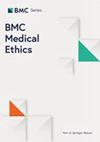Facing a request for assisted death - views of Finnish physicians, a mixed method study
IF 3
1区 哲学
Q1 ETHICS
引用次数: 0
Abstract
Assisted death, including euthanasia and physician-assisted suicide (PAS), is under debate worldwide, and these practices are adopted in many Western countries. Physicians’ attitudes toward assisted death vary across the globe, but little is known about physicians’ actual reactions when facing a request for assisted death. There is a clear gap in evidence on how physicians act and respond to patients’ requests for assisted death in countries where these actions are not legal. A survey including statements concerning euthanasia and PAS and an open question about their actions when facing a request for assisted death was sent to all Finnish physicians. Quantitative data are presented as numbers and percentages. Statistical significance was tested by using the Pearson chi-square test, when appropriate. The qualitative analysis was performed by using an inductive content analysis approach, where categories emerge from the data. Altogether, 6889 physicians or medical students answered the survey, yielding a response rate of 26%. One-third of participants agreed or partly agreed that they could assist a patient in a suicide. The majority (69%) of the participants fully or partly agreed that euthanasia should only be accepted due to difficult physical symptoms, while 12% fully or partly agreed that life turning into a burden should be an acceptable reason for euthanasia. Of the participants, 16% had faced a request for euthanasia or PAS, and 3033 answers from 2565 respondents were achieved to the open questions concerning their actions regarding the request and ethical aspects of assisted death. In the qualitative analysis, six main categories, including 22 subcategories, were formed regarding the phenomenon of how physicians act when facing this request. The six main categories were as follows: providing an alternative to the request, enabling care and support, ignoring the request, giving a reasoned refusal, complying with the request, and seeing the request as a possibility. Finnish physicians’ actions regarding the requests for assisted death, and attitudes toward euthanasia and PAS vary substantially. Open discussion, education, and recommendations concerning a request for assisted death and ethics around it are also highly needed in countries where euthanasia and PAS are not legal.面对协助死亡的请求--芬兰医生的观点,一项混合方法研究
协助死亡,包括安乐死和医生协助自杀(PAS),正在全球范围内引起争论,许多西方国家都采用了这些做法。全球各地医生对辅助死亡的态度各不相同,但对医生在面对辅助死亡请求时的实际反应却知之甚少。在辅助死亡行为不合法的国家,医生如何采取行动和应对患者的辅助死亡请求,这方面的证据明显不足。我们向所有芬兰医生发送了一份调查问卷,其中包括关于安乐死和辅助死亡的声明,以及一个关于医生在面对辅助死亡请求时的行为的开放性问题。定量数据以数字和百分比表示。适当时使用皮尔逊卡方检验法检验统计意义。定性分析采用归纳式内容分析法,即从数据中归纳出类别。共有 6889 名医生或医科学生回答了调查,回复率为 26%。三分之一的参与者同意或部分同意他们可以帮助病人自杀。大多数参与者(69%)完全同意或部分同意,安乐死只应在患者出现难以忍受的身体症状时才被接受,12%的参与者完全同意或部分同意,生命变成负担应该是安乐死的一个可接受的理由。在参与者中,16% 的人曾面临过安乐死或临逝者安乐死的请求,2565 名受访者回答了 3033 个开放性问题,这些问题涉及他们对协助死亡的请求和伦理方面所采取的行动。在定性分析中,针对医生在面对这一请求时如何行动这一现象,形成了六个主要类别,包括 22 个子类别。这六大类分别是:为请求提供替代方案、提供护理和支持、无视请求、给予合理的拒绝、遵守请求以及将请求视为一种可能性。芬兰医生对协助死亡请求所采取的行动以及对安乐死和PAS的态度大相径庭。在安乐死和临终关怀不合法的国家,也非常需要就辅助死亡请求和相关伦理问题进行公开讨论、开展教育和提出建议。
本文章由计算机程序翻译,如有差异,请以英文原文为准。
求助全文
约1分钟内获得全文
求助全文
来源期刊

BMC Medical Ethics
MEDICAL ETHICS-
CiteScore
5.20
自引率
7.40%
发文量
108
审稿时长
>12 weeks
期刊介绍:
BMC Medical Ethics is an open access journal publishing original peer-reviewed research articles in relation to the ethical aspects of biomedical research and clinical practice, including professional choices and conduct, medical technologies, healthcare systems and health policies.
 求助内容:
求助内容: 应助结果提醒方式:
应助结果提醒方式:


